Existing User Log In
New User Registration
Register for a free account to gain full access to the VGChartz Network and join our thriving community.



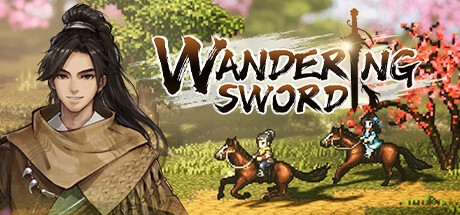

America - Front


America - Back

The Swordman Studio
Role-Playing
 (Add Date)
(Add Date) (Add Date)
(Add Date) (Add Date)
(Add Date)
| Owners: | 0 |
| Favorite: | 0 |
| Tracked: | 0 |
| Wishlist: | 0 |
| Now Playing: | 0 |
I'm convinced that the wuxia genre of fiction has been stalking me for some time now. What started with the unexpectedly strong Sword and Fairy: Together Forever last August continued with the release of Wo Long: Fallen Dynasty earlier this winter. It's reached the point where I fear a potential ambush from crouching tigers or hidden dragons; I haven't discovered any yet, but only because of all the crouching and hiding.
So, before I'm banished to some sub-dimension of reality, let me tell you a bit about the latest member of the family – Wandering Sword. By all accounts one of the strongest independent titles I've played thus far, Wandering Sword falls short of greatness due to a pair of problems that damage the experience, serving as a firm reminder why the phrase “good... for an indie” still exists in the gaming lexicon.
While escorting a caravan through the treacherous 'Outer Lands', mercenary Yi Yuwen is ambushed on orders of the mysterious Tianlong Gang. Wounded, Yi is taken in by Jiang Yinfeng, disgraced master of Wudang Sect, and trained in the ways of 'Qi' to heal his ailments. Following a subsequent encounter with a litany of rival schools and cults, Yi enlists in Wudang Sect to clear his master's name, rescue his surrogate sister, and quell the ongoing strife throughout the land.
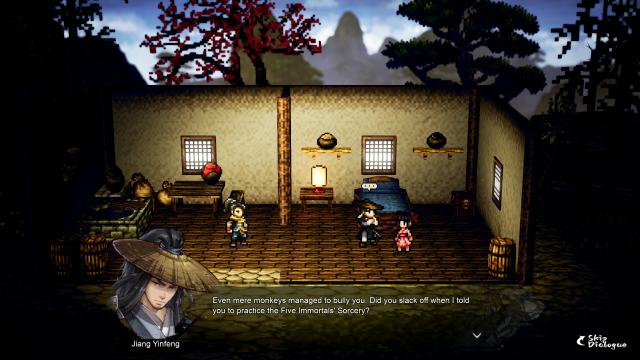
Wandering Sword is an impressive all-around package and distinguishes itself early on with its story. Though not my favorite of the indies I've played, the scale of magnitude and geography it encompasses is by far the grandest. Replete with dozens of developed NPCs (and potential party members), the world of Wandering Sword easily rivals its AAA contemporaries. Even better, the mechanics introduced by the gameplay make everything feel alive in ways most RPGs only hope to achieve.
Visually, Wandering Sword features the best pixelated graphics I've seen in any title. Its aesthetics will undoubtedly draw comparisons to Octopath Traveller, but a number of influences are on display; Xenogears and Golden Sun come to mind, and the world map comes eerily close to replicating Zelda II: The Adventure of Link. Combined with a consistently strong soundtrack, the level of immersion transcends labels like 'AAA' and 'indie'.
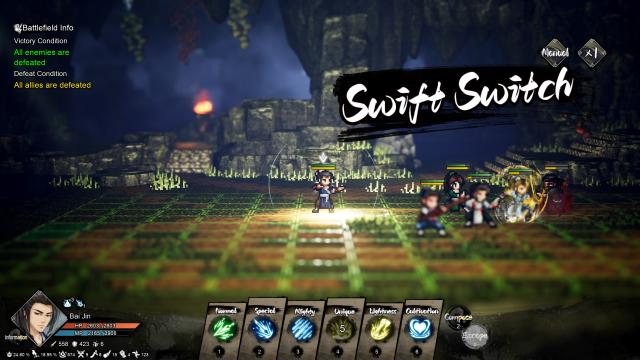
The gameplay of Wandering Sword is just as expansive as the world that encompasses it. From traditional battles and equipment customization, to diversionary activities like fishing and resource gathering, a number of unique inclusions serve to create an intricate web that ties everything together into one cohesive unit.
Combat primarily revolves around grid-based movement where attacks and spells affect panels around the participants. And though spending Magic Points and watching cooldown timers is old hat for RPG fans, the processes leading up to the classic style of fighting help spice it up beyond normal parameters.
Encounters themselves actually have three distinct systems of operation to choose from, each having advantages (and disadvantages) to take into consideration. 'Turn-Based' plays exactly how it reads, with allies and adversaries taking actions based on their Qi (speed) values in a more methodical setting. 'Real-Time' brings fighting more in line with the likes of Xenoblade Chronicles, where everybody acts independently in a visual cacophony of chaos. This mode shines during isolated duels: once the player has an idea of when the enemy's attacks are going to land, they can be deftly avoided and countered. Finally, an Auto-Battle expedites grinding and standard encounters – always a welcome feature. Alongside a x2 'fast-forward' option for all the above, the degree of personalization on hand is amazing. If you're seeking combat options, look no further.
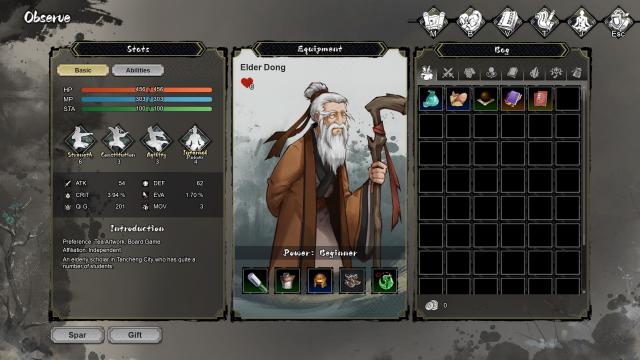
Aside from the battling (which is frequent and fun), a vital part of Wandering Sword is engaging in various acts of diplomacy with the denizens of the Greater Plains region. This is equal parts complex and convoluted, but its mastery is absolutely necessary to achieve success.
The vast majority of NPCs have personal bazaars containing items based on their preferences (equipment, blueprints, ingredients, artwork, etc.). 'Gifting' people raises their 'Affinity' with Yi, gradually unlocking the 'Spar' option. Victory nets items from their inventory, which are taken to certain instructors, and the process is replicated. 'Consulting' with these masters unlocks new Martial Arts abilities, as well as Cultivation Methods – powerful techniques that bestow stat-increasing Meridian Points. It definitely takes some getting used to, but the flow of Gift/Spar/Consult quickly becomes addictive; stalking the world map for that NPC with the rare teapot you met two hours into the game could make or break ascending towards the next level of power.
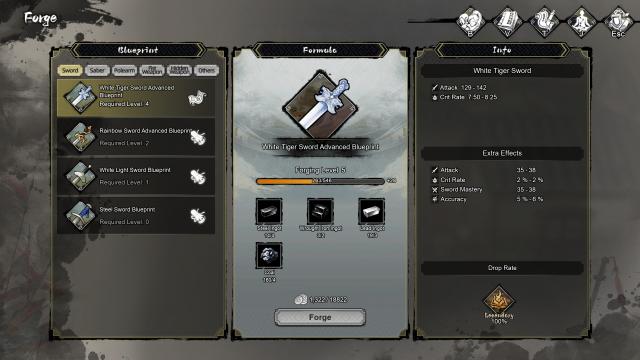
Traditional RPG staples also make their presence known. Forging/Tailoring are your standard crafting fare, with one notable exception: as player-made gear comes imbued with supplemental effects, it will always be superior to the equipment dropped by enemies. Cooking takes more time to develop than in most games, providing a strategic edge later on in the adventure. Fishing offers exclusive materials (even for weapons) to devout pescatarians. These activities might come off as superfluous (given the drop rate of items and ingredients) but developing them properly is key to making life easier.
As I mentioned before, Wandering Sword contains a couple of lingering issues that prevent it from attaining the same hallowed status that Everhood and Coromon occupy in my mind's eye: one is a design choice, the other a technical issue which shouldn't even exist.
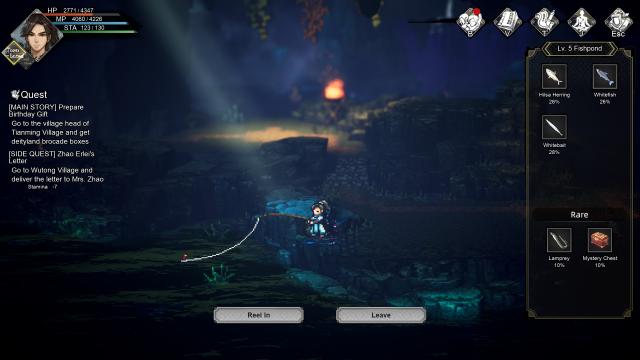
From a gameplay perspective, my biggest gripe is that progression in the main quest is restricted by how many side missions have been completed. Anyone who played Torna: The Golden Country understands how devastating of an impact this has on the flow and pace of a storyline, and sadly, it's back in full force. Worse is that each of these tiers of progress is gatekept by an instructor who must also be defeated in order for you to continue. Being forced to grind for 10-15 hours to overcome a single encounter leaves a really bad taste in one's mouth – especially having already spent 10-15 hours grinding before that (this is a JRPG, after all).
The other point of contention is the ongoing controller problems that have plagued Wandering Sword since pre-release. When it comes to technicalities such as these, I like to give developers the benefit of the doubt, but it's actually gotten worse over time and is now simply unforgivable.
I'm no programmer, but I'm guessing the root cause stems from accommodating the two-generation old Xbox 360 controller, in lieu of contemporary options. Ironically, my wired 360 controller was viewed as the plague on launch and didn't work; PlayStation 5 controllers weren't even acknowledged, and PlayStation 4 controls were too unresponsive to be viable. A workaround to this was piping a PS4 controller through a Steam Deck via Bluetooth – until a week ago, when an update brought these problems overseas. Unless you can utilize the Steam Deck's handheld controls, the last resort might be to play a turn-based RPG using a WASD keyboard layout, which I'm not dignifying with a response. If 'Partial Controller Support' reads as anything other than 'Completely Half-Assed', I'd like to know how else I'm supposed to interpret it.
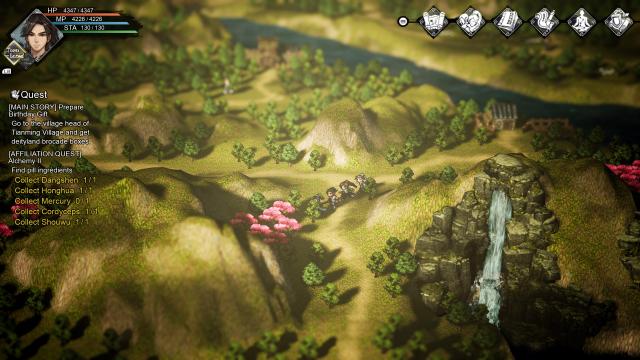
It's sad that a game about discipline and mastering the fundamentals falters on such basic levels, because Wandering Sword is a great game. If you told me five years ago that I'd accrue more time on an indie-RPG than the most recent Final Fantasy, I would have laughed – but it's absolutely true and for good reason: the characters, storyline, soundtrack, gameplay, and overworld are some of the strongest in any game I've played in the past few years (indie or otherwise). However, gating the main story's progress not only disrespects the player, but shows a lack of confidence in your game's design. The controller problems (that are being addressed) should be a non-entity. Together, these two issues leave noticeable welts on an otherwise beautiful face.
If you're a fan of indie games, JRPGs, or a combination of either, Wandering Sword is certainly worth the investment. But just keep in mind the cowboy's sad, sad song: every rose has its thorn – or in this case, thorns.









